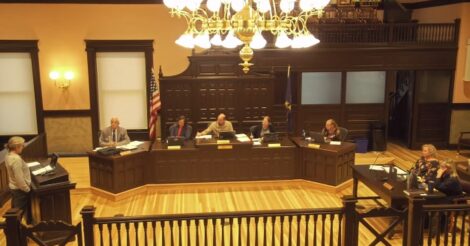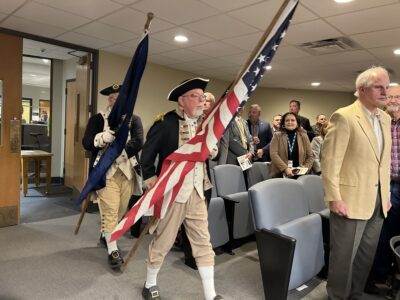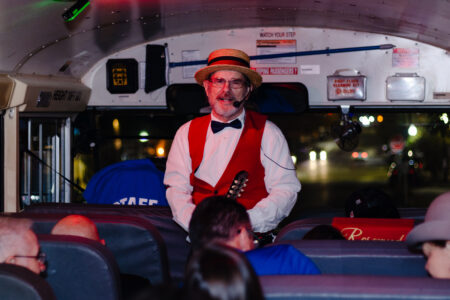At workshop, advocates say SNAP disruptions could ripple through Douglas County’s ‘extremely fragile’ food systems
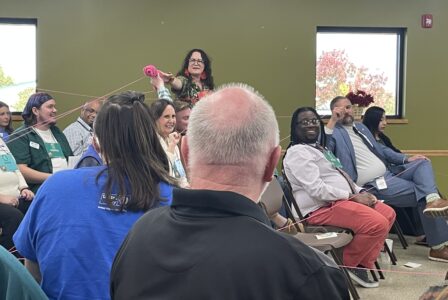
photo by: Sylas May/Journal-World
Emily Lysen of the Lawrence Farmers Market passes a ball of pink yarn around for an activity in a food systems workshop on Thursday, Oct. 23, 2025, at the Douglas County Fairgrounds.
When guests walked into Thursday’s food policy workshop at the Douglas County Fairgrounds, Emily Lysen of the Lawrence Farmers Market greeted each one and reminded them that “everybody is a part of the food system.”
And then, when everyone was seated, she got out a ball of pink yarn and began to illustrate that.
The crowd had all been asked to pick up lanyards labeled with different roles, such as growers, transportation, processors, packagers, eaters, disposers and reusers of food. Lysen called off one role after another and tossed the ball to people with that kind of lanyard. Within a few minutes, a pink web would form, touching everyone in the room.
“It’s going to get complicated,” Lysen said as she passed the yarn around — which, toward the end, required some tricky maneuvering to keep her from getting tangled up. “This is the point!”
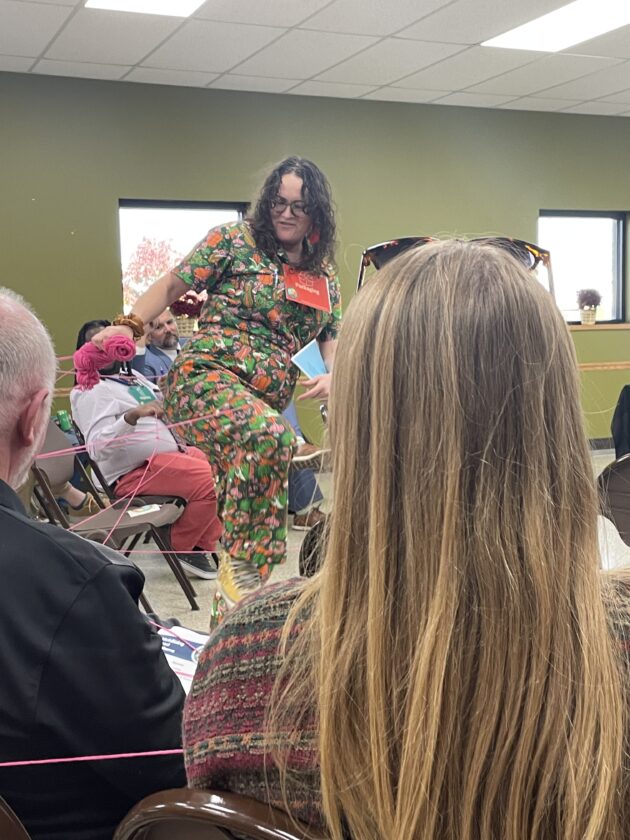
photo by: Sylas May/Journal-World
Emily Lysen of the Lawrence Farmers Market tries to avoid getting tangled in pink yarn during a food systems workshop on Thursday, Oct. 23, 2025, at the Douglas County Fairgrounds.
But the other side of that point, Lysen said, was that if any part of the food system drops out, that also touches everyone.
That happened during COVID with disruptions to transportation and other parts of the food system, she said. And, with the current government shutdown threatening to cut off SNAP benefits, it could happen again.
As the Associated Press has reported, the fate of SNAP — short for the Supplemental Nutrition Assistance Program — is becoming more of a concern as the federal government shutdown, which began Oct. 1, drags on. On Nov. 1, SNAP, which helps about 1 in 8 Americans buy groceries, could dry up without either a resolution of the shutdown or other action by Congress.
“We are potentially at a food crisis starting this week losing access to SNAP,” Lysen said.
Thursday’s event wasn’t just about that looming crisis, but SNAP certainly was on the minds of the panelists who’d gathered to speak: Democratic state Rep. Suzanne Wikle, Harvesters chief resource officer Elizabeth Keever, lobbyist Mallory Lutz of Little Government Relations, Lawrence-Douglas County Public Health policy analyst Shelby Ostrom, and Eudora school district Superintendent Stu Moeckel. Here’s what they had to say about SNAP, grassroots advocacy and the ways in which food connects us.
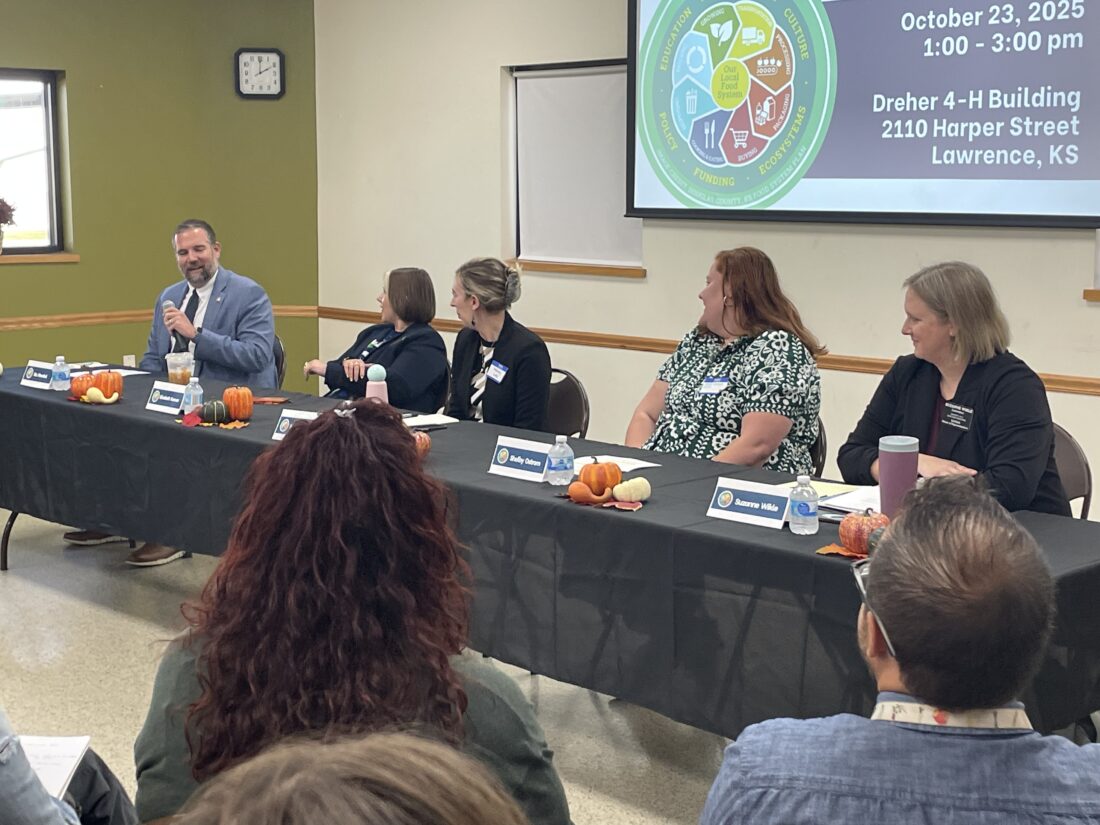
photo by: Sylas May/Journal-World
From left to right, Eudora school district Superintendent Stu Moeckel, Harvesters chief resource officer Elizabeth Keever, lobbyist Mallory Lutz of Little Government Relations, Lawrence-Douglas County Public Health policy analyst Shelby Ostrom and Democratic state Rep. Suzanne Wikle take part in a panel discussion at a food systems workshop on Thursday, Oct. 23, 2025, at the Douglas County Fairgrounds.
Beyond charity’s capacity
Keever didn’t sugarcoat what would happen if SNAP benefits fell through. She said if that happened, charitable organizations absolutely could not fill the gap.
“The scale is beyond the capacity of the charitable system, full stop,” Keever said.
SNAP is a much bigger program than the food banks and other charities. Kansans would normally use $34 million of SNAP benefits a month, she said, and for every person charitable organizations feed, “SNAP serves nine.”
Wikle agreed that this was a burden that charities couldn’t handle.
“Charity cannot replace $34 million a month,” she said. “It is not possible.”
The number of people in Kansas who could lose benefits if the shutdown isn’t resolved is 188,000 people or 93,000 households, as Kansas Reflector reported this week. And Keever said that when SNAP is disrupted or cut, “that does not happen in a vacuum.” It ripples through to where those people shop, for instance — it has an impact on grocery stores’ sales and the people who work there.
“What’s happening right now is scary,” Keever said. She later added that if you can “give time, food, money or voice, now is the time to do it.”
Telling stories and taking action
Some of the speakers urged citizens to reach out to legislators or take other political action on food issues, and they had some advice: Tell stories, and get other people to join in.
“Stories are incredibly impactful,” Ostrom said. “Unless we have the stories of what’s happening on the ground, a lot of times people don’t know.”
Haley Kottler, of Kansas Appleseed, spoke before the panelists began and said that “it’s a lot easier to close your eyes and vote” when you’ve not heard from the community. And then, she called on someone in the audience with practical experience: Democratic state Sen. Marci Francisco.
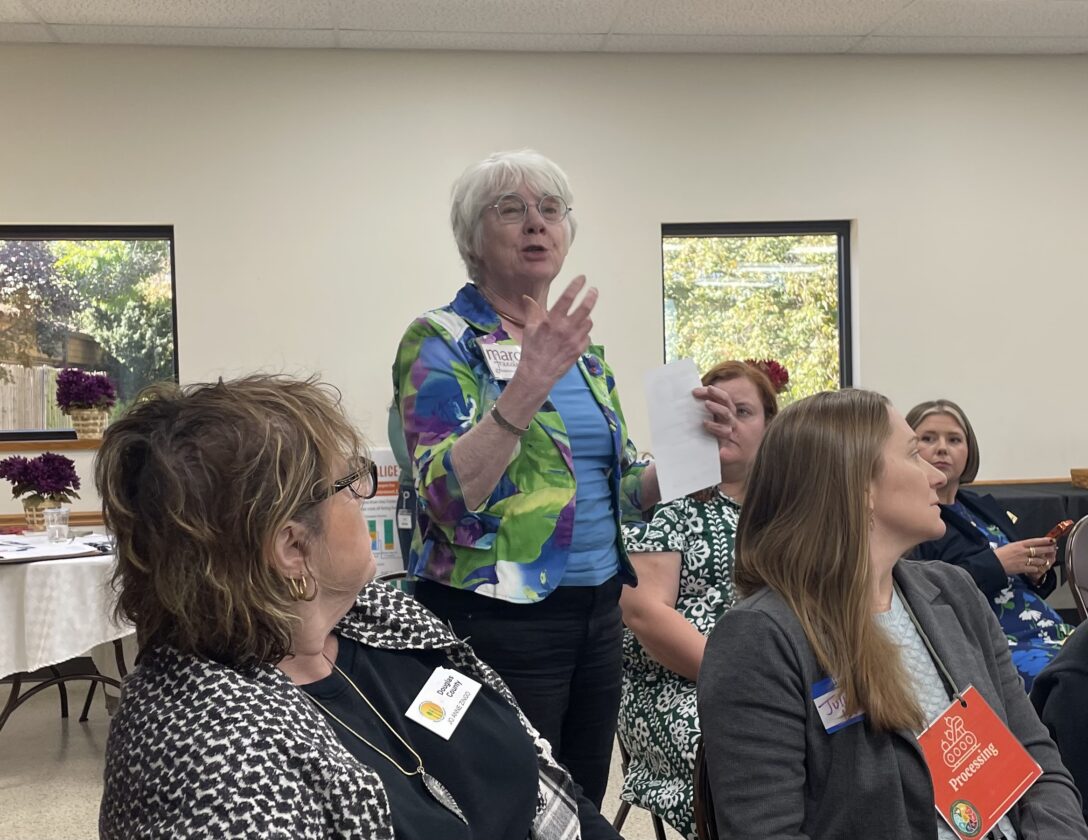
photo by: Sylas May/Journal-World
State Sen. Marci Francisco speaks during a food systems workshop on Thursday, Oct. 23, 2025, at the Douglas County Fairgrounds.
As a lawmaker, Francisco said, “it’s really fun to get up on the floor” of the Senate and say just how many people you’ve heard from about a particular issue. “Twenty is a number that really sticks,” she said.
Some of the panelists also said it was important to frame hunger and food access in a different way, one that’s less about politics. Lutz said she wished that food policy could be viewed by legislators more like transportation policy, an area she said had “momentum, enthusiasm and true bipartisan effort.”
And Wikle, who serves on the Kansas House agriculture committee, said that if the policy decisions were only made differently, hunger would not be such a problem.
“Call Congressman (Tracey) Mann,” the Republican who represents Lawrence and the rest of the 1st District in Congress, Wikle said. “Hunger is a policy choice, and they are making the wrong choice, and they need to hear it!”
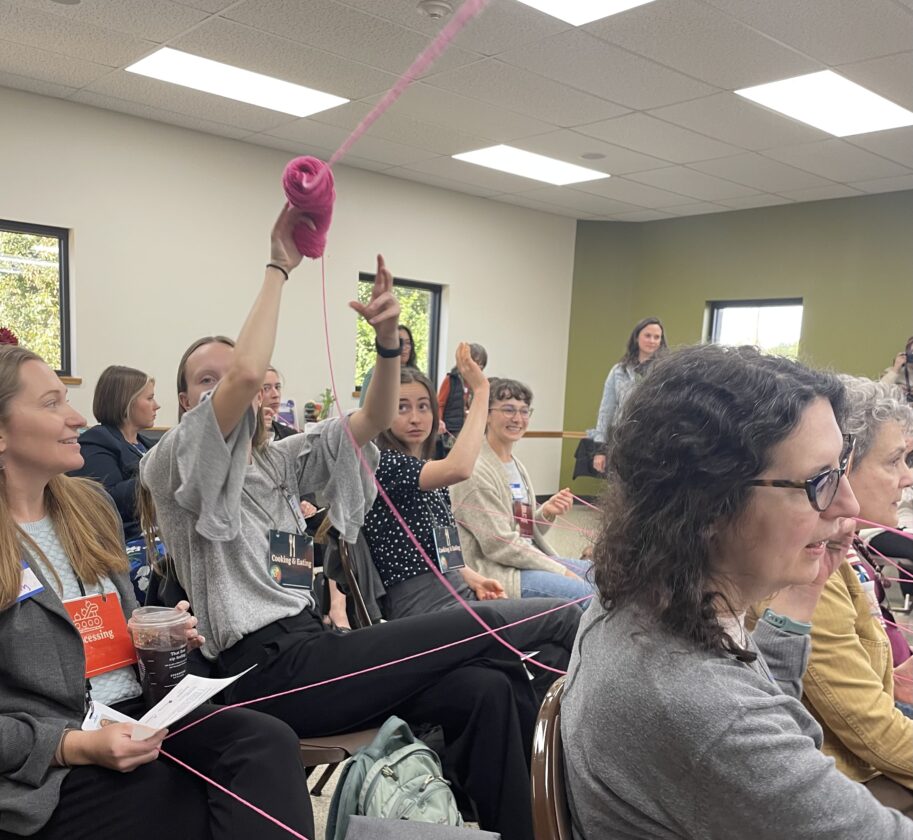
photo by: Sylas May/Journal-World
A participant in a food systems workshop catches a ball of pink yarn on Thursday, Oct. 23, 2025, at the Douglas County Fairgrounds.
‘A very fragile ecosystem’
There was plenty of discussion on Thursday about national and state politics, but Moeckel also spoke about a program much closer to home: his district’s experience of starting a free breakfast program for all students.
The Eudora district’s program served more than 100,000 meals from August 2024 to May 2025, and Moeckel said it was “the epitome of grassroots.”
“One of the leaders in our district said, ‘Why can’t we offer free breakfast?'” Moeckel said, and it grew from there with support from teachers, administrators and families. “It’s only sustainable if our families take advantage of it,” he said.
Moeckel said many people still don’t really appreciate that schools are “community food hubs.” He spoke of “the look of sheer fear and panic in a family’s eyes when the weekend’s coming and they don’t have anything in their cupboards,” and said that schools are a critical link in helping people make ends meet.
That means school employees are touched by flaws in the food system, too, as well as people who work in distribution, transportation and many other tangentially related fields.
“It’s a very fragile ecosystem; we learned (that) with the yarn thing,” Moeckel said. And if any part of it fails, “all the people who may not work next to food will all feel that.”
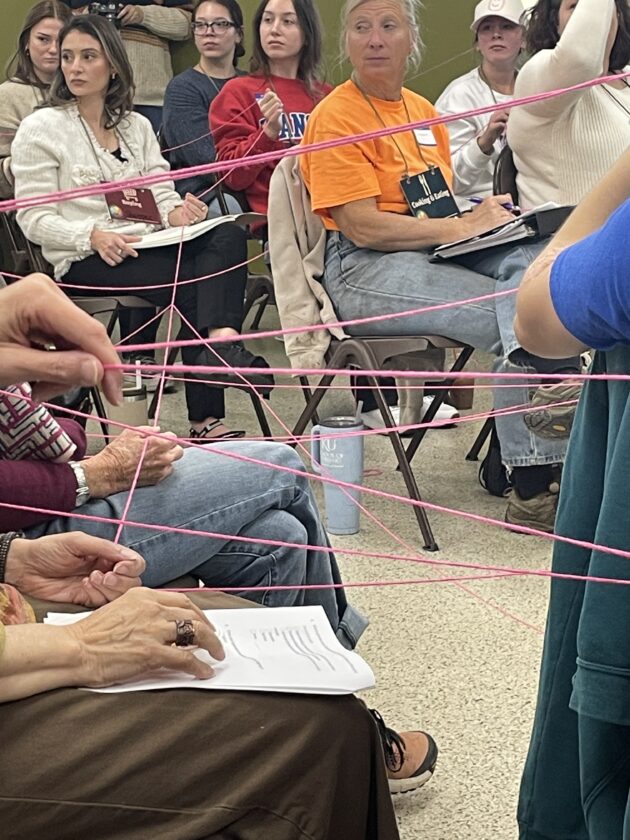
photo by: Sylas May/Journal-World
Pink yarn forms a tangled web among the participants in a food systems workshop on Thursday, Oct. 23, 2025, at the Douglas County Fairgrounds.



